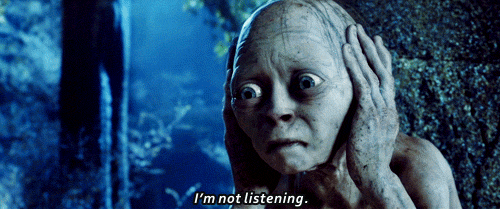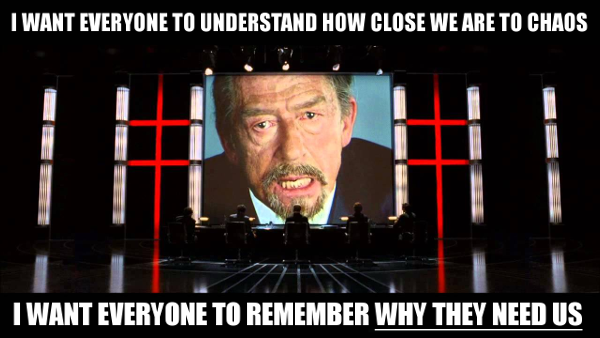(Pardon my French ;-)
Don't worry, I'm not going to embark in a tirade against religion. While I do believe, as Voltaire remarked, that “those who have the power to make you absurd have the power to make you unjust,” this is beyond religion.
We have been relentlessly led to believe, for decades now, that somehow ideologies do not have a place in politics anymore. Instead, all we should pursuit is a rational approach to practical problems.
Among the stupid things we believe, this is probably the most stupid one.
A political ideology is simply a collection of ideas that is more or less comprehensive, in the sense of covering different aspects of our social life. Indeed, each one of us lives in a society that is essentially kept together and driven by a political ideology, something we fail to notice until the ideology changes or we experience a different society. It is like the smell of the city we live in, something we don't notice until we come back from a long trip.
The ideologies we live in are made of many ideas, some of them good, some of them bad. Saying that political ideologies are dead is just an attempt to convince us that we shouldn't revise the ideas that drive our particular society at a particular moment, because they have somehow proven to be correct.
I don’t think that is the case. We have been wrong about lots of things in the past, even in the recent past, and most likely we continue being wrong about a whole lot of other things, right now.

The ideologies that we live in are very important in politics because they determine which proposals for change are considered seriously, and which are summarily dismissed. In the political arena, ideologies determine who is reasonable and who is insane.
By accepting, against all rational thought, that the particular political ideology in which we live is somehow optimal, we have decided that we don't want to hear anything that challenges it. This fossilizes deeply held but ultimately stupid beliefs, including:
- That the greed of others is good for us.
- That the next war will make us safe.
- That politics and politicians are bad.
- That something is always going to save us, -or-
That it is best to sit and wait for a collapse.
Abandoning these and other stupid beliefs won't solve everything: one can take great ideas and great intentions, and do something awful with them. However, many of the worst decisions we've collectively taken during 2015 (and accepting them passively is part of that) ultimately can be traced to some of these bad ideas we haven't been able to revise.
We believe the greed of others is good for us
This is a faulty generalization from the observation that, under specific circumstances, specific types of greed can create specific social benefits. For instance, when Adam Smith coined his famous “invisible hand” phrase, he was referring specifically to the preference of investors for domestic investment instead of foreign one. Instead, we have discarded the contexts in which greed might be good, and take this as if it where some universal law of nature.
Believing that the greed of others is good for us has allowed entire industrial sectors to capture the regulators that are suppose to keep them from harming us (and themselves!). Greed in our political system means economic interests determine what changes and what stays the same, while the interests of citizens have little influence.
Even worse, the defense of unrestricted greed has tied it to concepts that have nothing to do with it. For instance, placing limits on greed doesn't mean we don't respect private property. Instead, it means we want the property of the poor to be protected, not only the property of the rich. To me this has nothing to do with ending capitalism. But maybe I'm wrong, and, as Slavoj Žižek has repeatedly warned, I find it easier to imagine the end of the world than the end of capitalism.
We believe the next war will make us safe
In the US, heavy furnitures such as unstable bookshelves and large TV sets crush to death about 30 people every year, many of them children. Preventing their deaths would not require expensive military campaigns, yet the "war on terror" seems to be exactly what the US public think it needs in order to feel safe.

In France, after the Paris attacks the president asks and obtains “special powers” than he now wants to make permanent through constitutional amendments. War mongering leaders in Europe and America play with fear and swear they will protect us … if we just give them a little more power.
They say they will protect us by starting and winning a war. At the end of the war, there will be celebrations with music and fireworks, and everyone who was against us will surrender and quietly go home while the credits roll. They will promise never to harm us again. The world will be at peace.
Except it won't. It never has.
Peace is difficult to achieve, and killing people is a quite cinematic but fairly ineffective way of progressing towards that goal. Peace has many pre-conditions including an effective government, low levels of corruption, a sound business environment, acceptance of the rights of others, and high levels of human capital. Too many of us believe safety will be achieved through more wars; too few of us are thinking on how to create peace.
We believe politics and politicians are bad
Contrary to popular belief, our politicians don't fall from the sky. They are born among us, and while they often come from wealthy families, in the end it is we who vote for them. Do we have the ones we deserve? Maybe.
Politics is a way of distributing power and it plays a role in revising ideologies. Neither politics nor politicians are inherently bad. They are part of a process.
The problem is the process we have right now creates strong incentives for politicians to focus on two things, none of which is good for us. First, politicians have incentives to publicly and vocally support one or two policies favored by undecided voters, not majorities. Second, politicians have incentives to privately and quietly support whatever favors the elites who can help them get elected in their next campaign.
These things won't change overnight, but leaving democracy to its own devices will hardly make anything to improve it, unless …
We believe something will save us in the end -or-
Waiting for a collapse is the best
Mainstream left- and right-wing politicians rarely agree on something. When they agree on something, it is usually along the lines of some corporate interest. In the case of global warming, the left believes it is a serious problem, the right believes it is not, and the consensus is that it is a serious problem but we should do nothing about it.
The underlying belief is that something will save us in the end. Yes, the temperature will rise a few degrees, some polar bears will have to get a job in the circus, and a few small islands will be lost to the rising seas, nothing to worry about. Someone will invent an app or a machine that will make greenhouses go away, or perhaps others will change their habits so we won't need to.
This is indeed stupid; particularly considering the price tag of this stupidity might be astronomically high.
Some believe this is part of an impending collapse that ultimately will be good for us. I am not speaking about judgment day as, among others, extremist Christians and Muslims expect to happen any time soon.
Instead, I am speaking of a “rational” strategy, which is as follows. First, we completely refrain from political participation so that governments become increasingly illegitimate. Second, as we withdraw to the fringes of the system, we let a few people control most of the resources and take all the decisions. Third, we allow conditions in the planet to deteriorate to the point where things are unbearable and people start to die. Fourth, we chop a few heads, rename the months of the year, and start over.
Great plan—where do I click to support it?
It is easy to forget that we're a primitive society
As we celebrate progress, it is easy to forget the obvious fact that we live in a fairly primitive society. We stand divided, in more than one sense. Most of us can only communicate with a fraction of our fellow humans. None of us has ever left the close vicinity of our home.
“Maybe you earn less than your parents because you don’t have ideologies” said journalist Antonio Baños to masses of unemployed and underemployed voters in an interview.
We do have ideologies, plenty of them, the problem is that we don't recognize them as such, we take them as given, we tiptoe around them, we refuse to question them. We should understand they are opinions, not facts, and—to quote Voltaire once more—“opinions have caused more ills than the plague or earthquakes on this little globe of ours.”